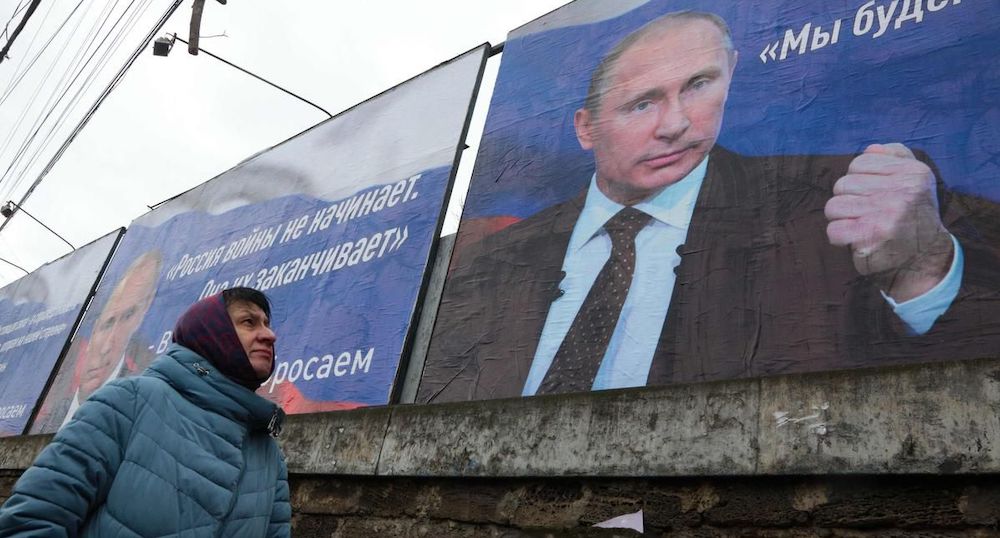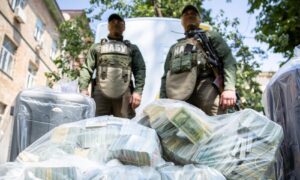(Editor’s note: You can read more here about how Vladimir Putin has long used Russian propaganda to counter objective reporting.)
We all live with one main thought now. “We,” as in, Ukrainian expats. The immigrants who found a new home in some other country, years before the war progressed into its current acute phase.
How is your family? Did you get someone out? How did they manage to leave?
Most of the people I know managed to get at least some loved ones out. Some pulled out the whole family, some only one person, or a few. Some are still glued to the news on the internet, scrolling the Telegram channels, refreshing online maps, reading headlines on news websites. Hoping — oh so hoping — to not see their hometown, their street, there.
Because someone was left behind. Too old, too sick, too weak, too scared, can’t drive, no car. Or just trapped in a town where military action literally doesn’t stop, so there’s no “green corridor”, no evacuation option.
We scroll the news and we see people dying, bombs destroying our towns. People get shot randomly in a bread line, or trying to evacuate in private cars. People who stepped out to get some food, while the air raids temporarily stopped. Families are broken because the women and children have to flee, but the men stay to help protect the country.
And there’s yet another side to that.
“How are your parents?” people ask me.
“They’re in Russia,” I say. They are safe.
There’s so much more to that than just them being safe.
In my eyes, my parents are destroyed by Russian propaganda. They call me and they try to ignore the situation completely, asking about my work, my kid, and how it’s going with the daycare.
When I mention the refugee relatives I now care for, the topic sometimes shifts, and then I hear the standard phrases:
It’s not Russian bombs. It’s not Russians who kill and destroy.
Or: there’s no war with Ukrainians; there’s a war with Americans.
Or: it’s a special operation, they don’t target civilians, only military objects.
Military objects, my ass.
My aunt was trying to speak to my mom, her younger sister, while her hometown was being shelled. She took her phone to the window and tried to make my mom listen to the Grads. She asked: what military objects have you seen in my neighbourhood?
You think that helped? Nope.



Russian propaganda leaves families dysfunctional and broken
I can’t really blame them, either. With the massive campaign of dehumanising Ukrainians in the Russian media that’s been going on for literally years, it is probably no wonder that they believe it. After all, it’s easier to believe something that doesn’t make you feel like shit.
It’s way easier to believe that your country is fighting the fascists than that your countrymen are the new fascists.
I can’t help thinking that they probably think the same thing. They think that we are brainwashed, not them. They say that there are “Nazis” and “Banderas” there. They continue blaming Ukrainians “jumping on the Maidan” for the war, as if that was what started everything.
Spoiler alert: it did not. What started the war was the Crimean occupation, and then that of Donbass. Initiated, of course, by Russian troops, who “weren’t there”.
I wasn’t “there” either. How can I know?
But I was still in Ukraine when the Maidan Revolution, the Revolution of Dignity, happened. I know that it wasn’t started by the “drug addicts” or “paid actors” or “American agents,” as the Russian propaganda would have people believe.
I know because many of my own friends, my colleagues, were there. Software developers, like me. System admins. Drivers. Office managers. People of Ukraine, with a good income and with a mediocre one, with or without family. I myself was trying to help by gathering warm clothes for Maidan defenders, and bringing food items for the people protecting our municipal administration building from being taken over by pro-Russian groups.
“It’s a special military operation,” they say.
Why is it taking place in someone else’s country?
Why have you brought your weapons, your tanks, your bombs, your military planes, into our towns?
The speaker of Russian Ministry of Foreign Affairs, a woman called Zakharova, stated that all the videos and photos of the bombed towns and injured or killed Ukrainian civilians are fake, fabricated by NATO. I have seen and read a lot of things that are hard to believe. This, however, takes the prize. But is it surprising that people who permanently live in Russia and see and hear the endless waterfall of lies, lies, lies and more dehumanization — would believe it?
“How are you?” my friends ask. “How is your family?“
How do I answer that?
Dysfunctional and broken.
How do you deal with zombie?
Even one of my aunts, who is still in Kharkiv being bombed and shelled, is persuaded that there’s no Russian troops.
“It’s not Russians who are bombing us,” she says. “It’s our own people.“
She is a pure Ukrainian and has lived in Ukraine her whole life, albeit only in the (mostly) Russian-speaking Kharkiv. But she is old, and misses the times when Ukraine was a part of USSR. She hated it when Ukraine became independent.
After the Revolution of Dignity happened, she stopped watching and reading Ukrainian news and instead started streaming Russian TV channels over the Internet. The poison they produced was spreading farther than just Russia, or even Russia and Belarus.
In her eyes, however, it’s we who are deceived. Poor miserable brainwashed souls, lost to American propaganda.
Sometimes I feel like I ended up in some eery TV show, the one about zombies. And some of my relatives have been bitten, so now they’re zombies too, but they still look and speak like the people I loved. Despite their eyes being unnaturally blue and burning like frozen fire.
Do I hug them and allow myself to be lost to the poison? Do I kill them to stop spreading it? Do I just run away and leave them to suffer?
She doesn’t even stop to think how stupid that is. Why would Ukrainians destroy their own country, kill their own people? For her, the answer is obvious. They want to discredit Russia. They want to make it look bad and justify their resistance.
“Isn’t the price too high?” I want to ask. “Do you think that for the people, for any people, such a goal would be worth it?“
But I forget … Ukrainians aren’t people in Russian’s eyes
Dehumanisation happens when a group of people people is consistently represented as deprived of positive human qualities. Usually it’s done by another group of people, let’s call it group number two, that wants to destroy the first one. Because, obviously, it’s difficult to kill people. Thou shalt not kill, remember?
But what if group one aren’t people but animals? Or worse than animals?
Then it becomes way, way easier.
About the author:
Maryna is a software developer from Ukraine who now lives in Germany. Maryna also writes a programming blog to share her knowledge. She sometimes speaks at conferences, though being an introvert, writing comes more naturally. She says she’s not a professional writer but writing is something she likes, “and I think I can do it pretty well.”
You can read more of Maryna’s Dispatches posts here.
Maryna is a software developer from Ukraine who now lives in Germany. Maryna also writes a programming blog to share her knowledge. She sometimes speaks at conferences, though being an introvert, writing comes more naturally. She says she’s not a professional writer but writing is something she likes, “and I think I can do it pretty well.”














